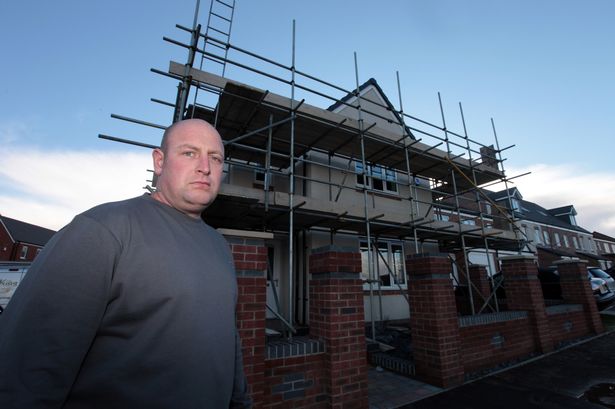“The test of our progress is not whether we add more to the abundance of those who have much; it is whether we provide enough for those that have too little.” …Franklin D Roosevelt
I was disgusted when I first reported on Persimmon Long Term Incentive Plan (LTIP) in April 2013 – I still am.
This week, Persimmon’s LTIP bonuses have come into further criticism and were the subject of universal widespread condemnation. Apart from their PR company spokesperson, no one can possibly agree that bonuses on this scale can be justified, even if there has been exceptional performance. Investment giant, Royal London Asset Management said Persimmon was being insensitive when many were suffering from their failure of house builders to construct enough homes, Mike Fox went further saying the payments were “too high in all circumstances”. The LTIP payments have been critically publicised this week in The Guardian, Daily Mail, Telegraph, Independent and on the BBC website.
Beleaguered Persimmon buyers across the country must have recoiled in disgust when they learned of the scale of the projected payments that 150 Persimmon executives will trouser over the next five years if, as seems likely, the twice extended, Help to Buy gravy train keeps on running all the way to house builders’ bank accounts until 2021.
“Optimising shareholder returns and maximising profit”
Persimmon is a company that places profit and value for shareholders above everything else. A quick glance at any of the last five annual reports leaves this is no doubt. At Persimmon, it would appear that greed isn’t just good, it’s compulsory! In their 2014 Annual Report Persimmon stated: “We remain focused on optimising shareholder returns in line with our long term strategic plan. The Group strives to maximise the value of each and every new home sold whilst controlling development costs to deliver the best gross margin from each site”
How must the much put upon site staff feel when they learn 150 of their directors are in line for life-changing bonus payments of up to £93million over the next five years, as in the case of CEO Jeff Fairburn. Most of them get by on industry-level salaries and in most cases, annual bonuses limited to four figures if they keep their noses clean! It would take it would take one of their site managers around 380 years to earn just one of Fairburn’s annual £19m bonus payments.
What has Fairburn achieved?
 But who is Fairburn; surely he must be some sort of house building guru or new homes genius to justify such a windfall? Sadly no. This is a man who has presided in a decline in the number of NHBC awards for quality that have been won by his 380 site managers, from 21 in 2012 to just six, (yes SIX!) in 2015 and only seven this year. A man that managed to oversee a fall in his company’s customer satisfaction levels and Star Rating in his first year in charge, maintaining it at the low 3 star level the following year. Amongst all the major house builders, only Bovis fares worse.
But who is Fairburn; surely he must be some sort of house building guru or new homes genius to justify such a windfall? Sadly no. This is a man who has presided in a decline in the number of NHBC awards for quality that have been won by his 380 site managers, from 21 in 2012 to just six, (yes SIX!) in 2015 and only seven this year. A man that managed to oversee a fall in his company’s customer satisfaction levels and Star Rating in his first year in charge, maintaining it at the low 3 star level the following year. Amongst all the major house builders, only Bovis fares worse.
 Persimmon featured on BBC Watchdog not once but twice in 2015. The second programme as a result of hundreds of disgruntled Persimmon buyers, from as many as 60 developments across the country, contacting the Watchdog office with their experiences of unfinished homes, defects and poor customer service. On a personal level, hardly a day passes when I am not contacted by a Persimmon buyer at the end of their tether, seeking advice on how to get this company to honour its warranty obligations, to finally and properly fix defects in their homes. Unlike most of his peers, Fairburn does not make his e mail address publically available.
Persimmon featured on BBC Watchdog not once but twice in 2015. The second programme as a result of hundreds of disgruntled Persimmon buyers, from as many as 60 developments across the country, contacting the Watchdog office with their experiences of unfinished homes, defects and poor customer service. On a personal level, hardly a day passes when I am not contacted by a Persimmon buyer at the end of their tether, seeking advice on how to get this company to honour its warranty obligations, to finally and properly fix defects in their homes. Unlike most of his peers, Fairburn does not make his e mail address publically available.
 It would appear that one of Fairburn’s first tasks was distance himself from his customers by taking his e mail address down. Anyone wishing to contact him must do so through via his second PA in less than three years, jacqueline.fennon@persimmon.com acting as a barrier from the many unhappy buyers complaining about their shoddy homes. Persimmon also uses an external PR company to deal with any press enquiries and issue the usual banal statements whenever there is any adverse publicity
It would appear that one of Fairburn’s first tasks was distance himself from his customers by taking his e mail address down. Anyone wishing to contact him must do so through via his second PA in less than three years, jacqueline.fennon@persimmon.com acting as a barrier from the many unhappy buyers complaining about their shoddy homes. Persimmon also uses an external PR company to deal with any press enquiries and issue the usual banal statements whenever there is any adverse publicity
Fairburn – “in the right place at the right time”
But these LTIP bonuses were never about adding value to the company or any perceived ability of those running it. They were never an incentive to work hard; this is a bonus for having the good fortune to be in the right place at the right time, riding a recovery boosted by ultra-low interest rate policies and unrivalled government support for the industry. A time when “£18bn worth of taxpayer-funded subsidies are holding up the business” as Ann Pettifor of the Policy Research in Macroeconomics put it on BBC Radio 2 Jeremy Vine last Monday. It could also be argued over the last three years, even a monkey sitting on his hands, could have done ‘as well’ as Fairburn.
Persimmon maintain that since the incentive scheme was put in place in 2012, allegedly backed by a majority of shareholders, the company has increased the number of new homes built by half. The LTIP will ultimately result in a total of 30million shares – a tenth of the company – being awarded to the company’s 150 top managers by the end of 2021. It said: “The analysis simply assumes that the share price in 2021 will be the same as it is today and ignores the challenge of returning £1.9billion to shareholders, while simultaneously growing the business to deliver an increase in the ex-dividend share price performance period of almost ten years……..This is a long term plan which is designed to drive outperformance through the housing cycle and there remains a very long way to go”
In 2013, 22% of Persimmon’s shareholders voted against the remuneration report after the UK shareholders’ Association came out against a £20million “golden goodbye” for the outgoing CEO Mike Farley and the long-term incentive plan (LTIP) under which, most of the grants had already been made. The UK shareholders’ Association says the arrangement is a “case study in regulatory failure….a huge transfer of value from a scheme that was never justified in the first place and has since been inflated by the effect of Help to Buy”.
At the £19.41 closing price of the shares on Friday, the deal is hypothetically worth £582.49m and would be one of the largest share bonus schemes ever awarded by a UK FTSE 100 company outside banking. But the LTIP was set up from an historic low base. Pre Help to Buy, Persimmon shares traded at 620p. In 2012, Persimmon built just 9,903 new homes after sacking 2,000 of its 50,000 employees following the global financial crisis. Since then, the number of new homes built by the company has increased, up 43% on 2012 levels by the end of 2015. By way of comparison, Redrow have increased new home completions by 63% since 2012.
The original LTIP was £400m. It is now reported to be £600m; 40% for the LTIP scheme vests in December 2015 and is paid out in January 2018. The remainder paid between 2017 and 2021 or when the Capital Return is completed. To qualify for the full payout the company must return £1.9bn to shareholders (equivalent to £6.20 a share) by 2021.
The LTIP made no mention to targets for improving the quality of the homes Persimmon build. There were no targets to increase the number of NHBC Quality Awards won by their site managers each year. No incentives of for attaining a 5 star Customer Satisfaction HBF survey rating (for the first time) and certainly, not related to any reduction in the number of complaints the company receives from its unfortunate customers.
Around a third of the scheme, worth around £206m based on Friday’s closing share price, is set to be shared among just five senior bosses, including chief executive Jeff Fairburn, who stands to receive a maximum of 4.8m shares worth almost £93.2m.
There is so much money flooding into the company through ever increasing profits – up a staggering 287% on 2012 levels, that the Capital Return Plan has also been increased 45% to £2.76bn or £9.00 per share. Indeed the Capital Return Plan has been a significant contributory factor in the 232% rise in share price since 2012.
Despite pressure and encouragement from the government, Persimmon has only marginally increased output. The total number of active sites has remained static at around 380 over the last three years. The number of new homes built by Persimmon in 2015 was 14,572 – up just 42% on 2012 levels. Indeed the annual rise in completions only started after the introduction of the Help to Buy scheme in April 2013.
House builders benefitted from Help to Buy
Since the start of Help to Buy, as at 31 December 2015, 15,708 buyers had taken advantage of the taxpayer-funded Help to Buy scheme to buy a Persimmon new home. Indeed since 2012, the company has built a total of 9,900 additional homes. Originally running until 2016, the government’s Help to Buy scheme was first extended to 2020 and again by one year, last autumn to 2021 – strangely coinciding with the last year of Persimmon’s senior management LTIP! It should not be overlooked that the reason that Help to Buy was introduced being due to the lack of affordable mortgage finance without a substantial 25% deposit following the financial crisis. This is no longer the case as lenders are falling over themselves to offer 95% loans at historically low interest rates for those that can meet the affordability test criteria.
Fairburn’s bonus – “completely obscene”
Commenting on Fairburns’s bonus and Persimmon LTIP, Mark Garnier Conservative MP and Member of the Treasury Select Committee told the Daily Mail: “This is completely obscene. Absolutely nobody is worth £100million. This is obviously a company that has losing its way and is not getting the balance right between rewarding its staff and serving shareholders and society as a whole”
Well Mr Garnier, you are in the right place to insist George Osborne imposes a large windfall tax levy on the excessive profits being made year on year, created on the back of the taxpayer-funded Help to Buy, a scheme that is now no longer necessary. It can also be argued that Help to Buy should at least be withdrawn from house builders such as Persimmon that fail to improve quality and service as I suggested at the APPG Inquiry into the Quality of New Homes in England. Mr Garnier part of this APPG Inquiry Committee!
Rather than paying £600million in bonuses to the already wealthy unproductive few, surely the £200million earmarked to be shared by just five senior bosses by 2021 would be better deployed improving all aspects of the quality of the homes Persimmon build. Providing additional resources to improve the failing customer care and plummeting levels of customer satisfaction. Better quality new homes would improve this company’s dire reputation and reduce the cost of post-occupation remedial works. Surely a CEO worth a £2million salary and a £20million a year bonus would know this! Sadly his legacy as a CEO at the company will be purely short term financial gain, rather than for building good quality homes and satisfied customers.







